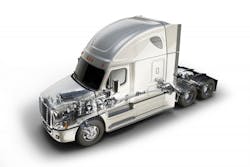NOVI, MI. Truck OEMs think they can use the “big data” extracted from their products to not only improve efficiency and performance but also help their fleet customers generate more revenue as well.
In a panel discussion here at 16th annual TU-Automotive Detroit 2016 Conference & Exhibition, held at the Suburban Collection Showplace in Novi, MI (a suburb of the Motor City) Frederick Callenryd, senior business strategy manager for Scania, and Shawn Meredith, manager of telematics strategy for Daimler Trucks North America (DTNA), stressed that technology and the data it collects is becoming an “enabler” to improve the business of trucking.
“All of that data allows us, the OEM, to cut our costs, but also helps the customer understand how their vehicles are being used so they can cut their costs,” Meredith noted.
Callenryd said Scania hopes to go a step further and use big data gleaned from its trucks to help improve customer efficiency – especially in terms of “where they not pulling as much freight of possible,” he stressed.
“Our long term goal is to use this data to help our customers generate more revenue and be more profitable,” Callenryd stressed. “Our customers tend to be very good at driving trucks but often not very good at business development in terms of equipment utilization and revenue generation.”“This is a huge topic; how to access vehicle data to improve load factors and improve fleet bottom lines,” added DTNA’s Meredith. “That’s also going to create a very different relationship with our customers. It’s an evolving model here in the U.S. as well as in other global markets.”
Scania’s Callenryd went further; stressing that connectivity will “completely shift the traditional ecosystem of buyer and OEM, rearranging it five years.”
Claes Herlitz, head of automotive for wireless network provider Ericsson, added that this goes beyond just trucking.
“It’s about creating connected environments at container ports, sharing data between trains and trucks, for example, to create more efficiency for both modes while improving safety,” he said. “It’s not about the technology; it’s about creating new business models.”
Putting all of that data into the proper context, however, will be the key to making the best use of it, stressed Aaron Solomon, CEO of Mobile Devices.
“The challenge is learning to use data properly; to make sure it is defined properly,” he said. “Collecting it and storing it are not the problems.”Indeed, Scania’s Callenryd noted that “if you torture data enough, it will correlate to just about anything.”
For example, he pointed out that if improved fuel efficiency data was correlated to yellow trucks, it would not result in Scania painting all of its trucks yellow.
On the flip side, DTNA’s Meredith said when data is placed in the proper context, huge changes can be made. “We’re already seeing our customers leverage operational data – how their trucks are routed, what drivers are assigned to them; it’s happening today and will only increase,” he emphasized.
Motor carriers also want to “democratize” such data more, especially for mixed fleets operating different brands of trucks. “They are pushing for more ‘standardization’ of data; to create single sources of data so they can more easily analyze it,” he pointed out. “Carriers are hiring people to make sense of the data and are starting to create such ‘data pooling’ on their own.”
About the Author
Sean Kilcarr
Editor in Chief
Sean Kilcarr is a former longtime FleetOwner senior editor who wrote for the publication from 2000 to 2018. He served as editor-in-chief from 2017 to 2018.


